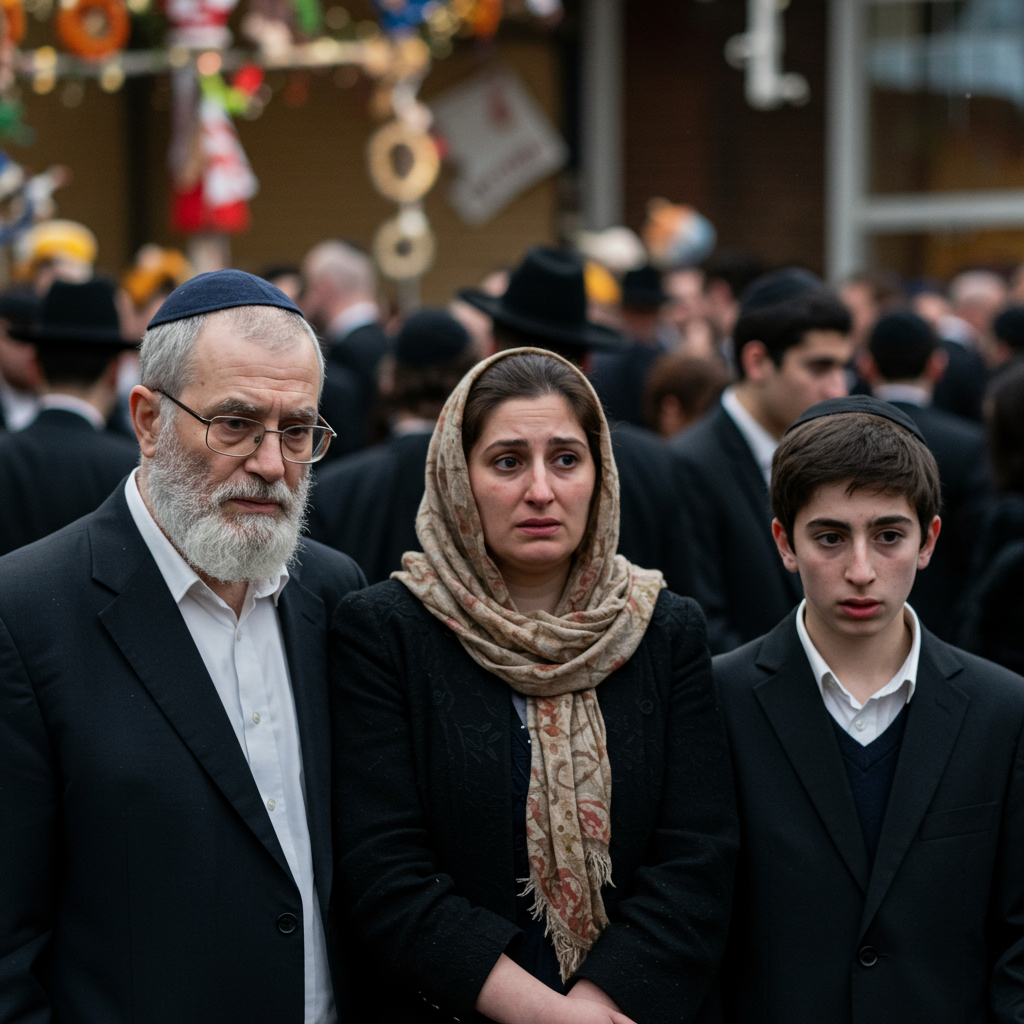An alarming rise in antisemitic incidents across the United Kingdom had already deeply concerned Jewish communities for months before controversial chants were broadcast live from the Glastonbury Festival. While the high-profile festival performance drew immediate outrage, it served as a stark public manifestation of a worsening climate that has seen british Jews increasingly report feeling unsafe and unwelcome in their own country. This disturbing trend escalated significantly following the Hamas attacks on Israel in October 2023, leading to unprecedented levels of hate crimes and a profound impact on the sense of security for many.
The incident gaining widespread attention involved UK rap-pop duo Bob Vylan during their set at Glastonbury. Live footage aired by the BBC captured frontman Bobby Vylan leading the audience in chanting “Death, death to the IDF [Israel Defense Forces].” Although the BBC included an on-screen warning about “very strong and discriminatory language” during the livestream on iPlayer, critics quickly argued this response was inadequate given the nature of the chants. The broadcast ignited a firestorm of criticism, highlighting not just the performance itself, but also questions about how such content was aired on public television and what it signifies about the current state of public discourse in the UK.
Record Highs in Antisemitic Incidents
Monitoring groups have documented a dramatic surge in antisemitic hate crimes and incidents across Great Britain. The Community Security Trust (CST), a charity dedicated to the security of the Jewish community, reported a staggering 4,296 antisemitic incidents throughout 2023. This figure represents the highest annual total ever recorded by the organisation, a significant increase from previous years.
The trend shows little sign of abating. By mid-2024, the CST had already recorded 3,528 incidents, putting the year on track for another near-record or potentially record-breaking total. These statistics paint a clear picture of a community facing escalating hostility, ranging from verbal abuse and harassment to physical assaults and damage to property. The sheer volume of reported incidents underscores the daily challenges and fears experienced by many British Jews.
The Post-October 7th Surge
Experts and community leaders widely agree that the period following the October 7th attacks on Israel marked a pivotal turning point. David Collier, an independent investigative journalist who monitors antisemitism, noted that the Glastonbury chant “didn’t come from an empty space.” He suggested the performance and the audience’s reaction reflected a worrying level of blindness within mainstream UK society towards what he termed “genocidal antisemitic ideology.”
The sharp increase in incidents immediately after October 7th demonstrated how global events can rapidly amplify anti-Jewish sentiment domestically. This correlation between events in the Middle East and a rise in antisemitism in the UK is a recurring theme, but the scale of the recent surge has been particularly alarming.
Impact on British Jewry
The relentless rise in antisemitism has had a profound psychological and practical impact on the UK’s Jewish population. A comprehensive survey conducted by the Campaign Against Antisemitism (CAA) in January 2025 revealed deeply troubling sentiments within the community.
Key findings from the CAA survey included:
Only 34% of British Jews believe their community has a long-term future in the United Kingdom.
Up to half of respondents reported having considered leaving Britain in the past two years specifically due to antisemitism.
Less than half (43%) stated they feel welcome in the UK.
A majority indicated they felt it necessary to hide their Jewish identity in public due to fear of antisemitic harassment or attack.
- Fewer than one-tenth of British Jews felt that authorities were doing enough to adequately address and punish antisemitic behaviour.
- www.foxnews.com
- www.aol.co.uk
- www.aol.co.uk
- www.iask.ca
These statistics highlight a crisis of confidence among British Jews regarding their place and safety in the UK. The need to conceal one’s religious identity in public is a particularly poignant indicator of the hostile environment many perceive.
Criticisms of Institutional Responses
Community leaders and commentators have voiced significant criticism regarding the response of key UK institutions, including the government and the media, to the rise in antisemitism. Many feel that responses have been insufficient, slow, or even complicit in allowing anti-Jewish hatred to fester.
A significant finding from the CAA survey was that 92% of British Jews believed media bias against Israel was fueling the persecution of Jews within the UK. The BBC, as the national public broadcaster funded by taxpayers, was specifically cited by respondents as being the worst in terms of its coverage related to Jewish interests.
Scrutiny on the BBC’s Role
The BBC’s decision to broadcast the Bob Vylan performance live drew particular ire. Former BBC director Danny Cohen wrote publicly that the corporation has repeatedly shown an inability to get its own house in order regarding antisemitism. He cited examples of alleged bias from BBC Arabic reporters and issues surrounding a documentary about Gaza. Cohen, along with others like former BBC editor Sir Craig Oliver, argued that the BBC should possess the technical capability to cut live feeds containing hate speech and that more senior editorial oversight is needed for major events.
Baroness Jacqui Smith also criticised the BBC’s handling, stating that the on-screen warning was “not good enough” and the content went “far beyond that.” She felt the performance “shouldn’t have been broadcast live” and that it should have been possible to stop it. The BBC later issued a statement acknowledging that “Some of the comments made during Bob Vylan’s set were deeply offensive” and “utterly unacceptable.” They admitted the livestream “should have pulled” the performance and confirmed it would not be available on demand. However, critics viewed this response as belated.
Calls for Accountability and Action
The incident at Glastonbury and the broader context of rising antisemitism have intensified calls for concrete action from authorities and institutions. The Board of Deputies, the umbrella organisation for the UK Jewish community, stated they would continue seeking answers from the BBC on how the content was broadcast and how future occurrences would be prevented. They also condemned Glastonbury Festival for allowing its stage to be used to promote chants calling for death, suggesting the festival’s stated values rang hollow.
Combat Antisemitism Movement CEO Sacha Roytman argued that inciting violence should be a “red line” that compels the government and the BBC to take measures against artists spreading hate and prevent them from accessing such platforms. The stark reality has even led some to consider more drastic steps. Israeli Minister for Diaspora Affairs Amichai Chikli publicly urged British Jews to consider leaving the country, stating that when such incitement is normalised, those who fail to act bear responsibility.
The issue extends beyond high-profile public events. Reports indicate concerns about antisemitism in other UK institutions, including universities. Goldsmiths, University of London, for instance, launched an action plan after an independent inquiry found Jewish students and staff had been exposed to antisemitism and that the university’s handling was inadequate. This inquiry highlighted a “disturbing picture” and insufficient existing processes, underscoring that the problem is not limited to specific incidents but can be systemic.
Frequently Asked Questions
What is the current state of antisemitic incidents in the UK?
Antisemitic incidents in the UK are at record levels. According to the Community Security Trust (CST), there were 4,296 incidents reported in 2023, the highest annual total ever recorded. As of mid-2024, 3,528 incidents had already been reported, indicating the surge continued and remained exceptionally high following the October 7th events. These statistics reflect an alarming increase in anti-Jewish hate crimes and behaviour across Great Britain.
How do recent surveys reflect how British Jews feel about living in the UK?
Surveys indicate a significant decline in the sense of security and belonging among British Jews. A January 2025 survey by the Campaign Against Antisemitism found only 34% believe the community has a long-term future in the UK. Up to half have considered leaving due to antisemitism, and less than half feel welcome. The majority also report needing to hide their Jewish identity in public, demonstrating widespread concern for personal safety.
What role is the media, particularly the BBC, accused of playing in UK antisemitism?
Critics, including a vast majority (92%) of British Jews surveyed by the CAA, believe media bias against Israel fuels antisemitism in the UK, singling out the BBC as particularly problematic. Concerns centre on perceived lack of neutrality in reporting, especially post-October 7th, and specific incidents like the live broadcast of antisemitic chants from Glastonbury. The BBC has been criticised for its handling of the broadcast and for perceived ongoing issues in addressing antisemitism within its organisation.
The incident at Glastonbury, while egregious, is best understood as a symptom of a deeper societal issue. The documented record levels of antisemitism, the profound impact on the British Jewish community’s sense of safety and future, and the concerns about institutional responses all point to a worrying trend. Addressing this requires not only condemnation of specific incidents but also a comprehensive effort to combat the underlying causes and ensure that all communities feel safe and welcome.



